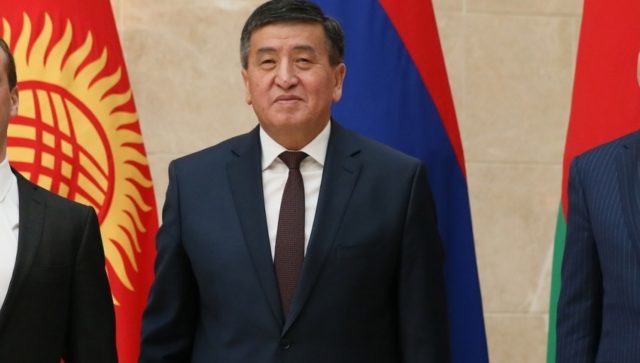
Government Reshuffle in Bishkek and Kyrgyzstan’s Steady Drift Away From Kazakhstan
Publication: Eurasia Daily Monitor Volume: 15 Issue: 31
By:

The security forces of Kazakhstan carried out a special operation on February 16, and detained 29 members of a criminal gang, which included customs officials as well as law enforcement officers. Among those arrested was Damirbek Asylbek ulu, a deputy of the parliament of neighboring Kyrgyzstan. The detention of such a high-ranking public figure prompted a note of protest from the Ministry of Foreign Affairs of Kyrgyzstan. But in response, Kazakhstani authorities announced that Asylbek ulu had dual citizenship of Kyrgyzstan and Kazakhstan and, thus, could be brought to trial inside Kazakhstan (Sputnik.kg, February 18).
A court in Almaty has charged Asylbek ulu, along with two other nationals of Kyrgyzstan, with dealing in contraband trade, punishable under Article 234, part 3 of the Criminal Code of Kazakhstan. The three men also face charges of setting up a transnational criminal gang and taking part in its activities, according to Article 264, part 2 of the Criminal Code. Members of Kyrgyzstan’s parliament (Zhogorku Kenesh) distanced themselves from the case, saying they would not interfere with the Kazakhstani investigation (Informburo.kz, February 19).
Shortly after deputy Asylbek ulu’s detention, the head of the anti-corruption service of the State National Security Committee (SNSC) of Kyrgyzstan, Duyshenbek Chotkarayev, was sacked from his post via presidential decree. He was appointed to this post by then-president Almazbek Atambayev, in May 2016. The dismissal followed recently elected President Sooronbay Zheenbekov’s sharp criticism leveled at officials of the anti-corruption department of the SNSC who, in his words “have turned into a caste of untouchables.” Zheenbekov specifically questioned the ability of some SNSC officials to perform their duties (Barometr.kg, February 8).
These developments may portend further dismissals of Atambayev-era officials in the coming months. Zheenbekov is heavily indebted to his predecessor for winning the presidency late last year: the two men founded the Social Democratic Party back in 1995, and he received massive support from Atambayev during the election campaign. But apparently, President Zheenbekov now feels that to reach his stated priority goals of boosting the economic development of Kyrgyzstan’s regions as well as mending fences with its neighbors—particularly with partners in the Eurasian Economic Union (EEU) and with China—he has to rid himself of people from Atambayev’s entourage and improve the Kyrgyz Republic’s international image. On February 2, he apponted Aizada Subakozhayeva, a Beijing-educated expert on China who earlier served as the third secretary in Kygyzstan’s embassy in Beijing, to head the presidential administration’s foreign policy department (Knews.kg, February 9).
On February 20, Emil Kaikiev, a former Kyrgyzstani deputy foreign minister and an experienced diplomat, was appointed minister of energy and infrastructure within the Eurasian Economic Commission (EEC) by EEU member states (Kabar.kg, February 20).
Bilateral relations with Kazakhstan had soured to a critical point under Almazbek Atambayev. But Since Zheenbekov’s ascendency to the presidency, this relationship has been showing some signs of improvement. Shortly after the Kyrgyzstani presidential elections (held on October 15), Kazakhstan reopened its border for cargo trucks and citizens of the Kyrgyz Republic. The border was shut down last fall by Kazakhstani authorities following Atambayev’s verbal attacks on President Nursultan Nazarbayev (see EDM, September 27, 2017; October 18, 2017). Talks between the two countries’ leaders on the sidelines of the November 30 Minsk Summit of the Collective Security Treaty Organization (CSTO) as well as the later visit by Zheenbekov to Kazakhstan on December 25–26 were assessed by Bishkek as important steps toward a final demarcation of their 1,241-kilometer-long shared border. In addition, Kyrgyzstan saw these as helping to improve trade relations within the Eurasian Economic Union (Abctv.kz, December 25, 2017).
And yet, there is little to indicate that Sooronbay Zheenbekov prioritizes relations with Kazakhstan at this point. His first official foreign visit as president of Kyrgyzstan was to Uzbekistan, not Kazakhstan. Speaking in the city of Isfan, in the Batken region, on February 20, he said that Kyrgyzstan would build friendly relations with all neighboring states. But in fact he mentioned only his meeting with his Uzbekistani counterpart, Shavkat Mirziyayev, with whom he reached “mutually acceptable solutions on many issues,” including common borders. “Border talks with Tajikistan are also on the right track,” Zheenbekov added (24.kg, February 20).
It could be expected that membership in the Eurasian Economic Union would bring Kyrgyzstan and Kazakhstan closer. But the increasing flow of smuggled Chinese goods to Kazakhstani markets through Kyrgyzstan, the lack of adequate phytosanitary controls of agricultural produce on Kyrgyzstan’s side of the border, problems related to illegal Kyrgyzstani migrant workers in Kazakhstan, as well as the scarcity of irrigation water for South Kazakhstan coming from upstream Kyrgyzstan remain persistent sources of disputes. So far, joining the EEU has not helped solve any of these problems, and hardly will, unless the two fraternal Central Asian countries show a genuine willingness to settle their bilateral issues jointly.



